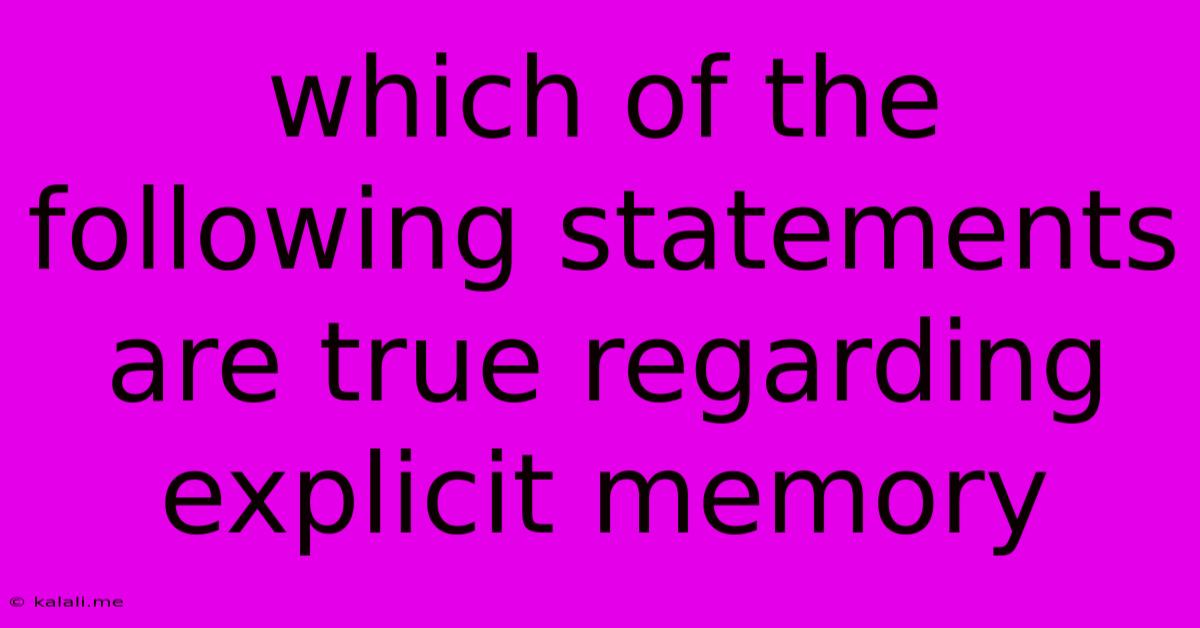Which Of The Following Statements Are True Regarding Explicit Memory
Kalali
Jun 14, 2025 · 3 min read

Table of Contents
Which of the Following Statements Are True Regarding Explicit Memory?
Explicit memory, also known as declarative memory, is a type of long-term memory that involves conscious and intentional recollection of factual information, previous experiences, and personal events. Understanding its characteristics is crucial for comprehending how we learn, remember, and retrieve information. This article will explore several statements regarding explicit memory and determine their accuracy. We'll delve into the nuances of its subtypes – episodic and semantic memory – to clarify common misconceptions.
What is Explicit Memory? Explicit memory is what we typically think of when we talk about remembering things. It's the memory system responsible for consciously recalling information. This contrasts with implicit memory, which involves unconscious or automatic remembering, such as riding a bike. The key difference lies in the conscious awareness involved in retrieval.
Let's examine some common statements about explicit memory and determine their truthfulness:
Statement 1: Explicit memory involves conscious recall of facts and events.
TRUE. This is the fundamental definition of explicit memory. It requires conscious effort to retrieve the information. You actively think about the memory and bring it to the forefront of your awareness. This contrasts with implicit memory, where the recall happens automatically without conscious effort.
Statement 2: Episodic memory is a subtype of explicit memory that stores personal experiences.
TRUE. Episodic memory is one of the two main types of explicit memory. It's your autobiographical memory; it stores specific events, experiences, and their context (time and place). Think of your last birthday party, your first day of school, or a memorable vacation – these are all examples of episodic memories.
Statement 3: Semantic memory is a subtype of implicit memory related to general knowledge.
FALSE. Semantic memory is a subtype of explicit memory, not implicit. It stores general knowledge about the world, facts, concepts, and language. This includes things like knowing the capital of France, understanding the meaning of words, or knowing the rules of grammar. While you access this knowledge consciously, it's not tied to a specific personal experience like episodic memories are.
Statement 4: Explicit memories are easily and permanently stored.
FALSE. While some explicit memories can be incredibly robust and long-lasting, many are fragile and susceptible to forgetting. Factors like interference from other memories, the emotional significance of the event, and the quality of encoding all influence how well an explicit memory is retained. The process of consolidation (the strengthening of a memory trace over time) is also crucial and can be impacted by various factors including sleep and stress.
Statement 5: Damage to the hippocampus can impair explicit memory but not implicit memory.
TRUE. The hippocampus plays a vital role in the formation of new explicit memories. Damage to this brain region often results in anterograde amnesia, an inability to form new long-term explicit memories. However, implicit memory systems are often relatively spared in hippocampal damage, indicating separate neural pathways for these memory types.
Statement 6: Rehearsal and elaboration enhance the encoding of explicit memories.
TRUE. Rehearsal (repeating information) and elaboration (connecting new information to existing knowledge) are effective strategies for strengthening the encoding of explicit memories. The more deeply you process information, the more likely it is to be stored and retrieved successfully. Active recall, testing yourself, and spaced repetition are also powerful techniques.
In conclusion, understanding the characteristics of explicit memory is essential for comprehending human cognition and learning. By differentiating between its subtypes and recognizing the factors that influence its formation and retrieval, we can develop better strategies for learning and remembering information.
Latest Posts
Latest Posts
-
What Is The Least Common Multiple Of 12 And 14
Jun 14, 2025
-
How To Find Average Net Force
Jun 14, 2025
-
Whats The Difference Between Certified And Registered Mail
Jun 14, 2025
-
Difference Between A State And A Union Territory
Jun 14, 2025
-
What Cells In The Body Are Least Radiosensitive
Jun 14, 2025
Related Post
Thank you for visiting our website which covers about Which Of The Following Statements Are True Regarding Explicit Memory . We hope the information provided has been useful to you. Feel free to contact us if you have any questions or need further assistance. See you next time and don't miss to bookmark.